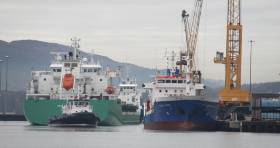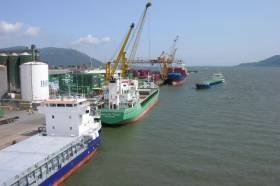Displaying items by tag: Quinn Cement
Quinn Cement Facility in Warrenpoint to Support Export Growth Post-Brexit
#QuinnCement - Quinn Cement and Warrenpoint Harbour Authority have announced the opening of a new cement export hub at the Co. Down port.
The £2.5 million investment reflects a 10-year deal between the Cavan-based company and WHA. Final commissioning of the new facility was completed at the end of last month.
The export hub, which has an operational capacity of 7,500 tonnes will be dedicated to the export of bulk cement from the Quinn Cement operations in Ireland. The investment is a key pillar in Quinn Cement’s growth agenda for its GB operations and complements a £1.3 million upgrade to the Quinn Cement GB import facility in Rochester, Kent.
Commenting on the development Dara O’Reilly, CFO of Quinn Industrial Holdings said “This is an important and timely development for the business ahead of Brexit. It will allow Quinn Cement to strengthen our supply chain for bulk product, accommodate more flexible transport from our production facility in Co. Cavan and enhance the competiveness and sustainability of our operations on both islands. It also represents an endorsement of our working relationship with Warrenpoint Harbour Authority who have been extremely good to work with.
“Importantly, we believe this investment will help sustain and grow jobs at Quinn Cement and underpin economic activity on both sides of the border and in the south of England.”
Commenting on the development Warrenpoint Harbour Authority Chief Executive, Peter Conway said “The Port is delighted to consolidate the excellent trading relationship with Quinn Cement with the opening of the new export hub at the harbour. This investment and 10-year deal demonstrates the long term commitment of both parties to the successful business venture and is a major enhancement to the port’s trade."
"The Quinn Cement venture is a further demonstration of the Port working as an economic driver creating prosperity and jobs in the local economy and the Authority wishes Quinn every success in the future growth of its business.” added the Chief Executive.
Quinn Cement to Upgrade Export Base at Warrenpoint Harbour
#Cement - Five new cement silos for Quinn Cement reports The Irish News are to be built at Warrenpoint Harbour in a £2.5 million investment.
The silos will have total storage capacity of 7,500 tonnes and will be dedicated to the export of Quinn's products.
The Fermanagh-based company has signed a 10-year deal with the harbour which construction work expected to be complete by September.
Quinn Cement said it was one half of a strategy aimed at increasing its presence in the British cement and construction markets.
For more on the story click here.































































